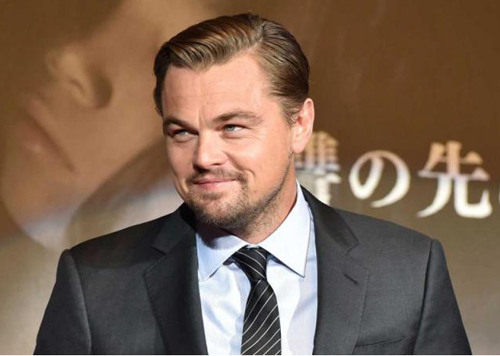
Leonardo DiCaprio has a diamond proposal for you. The Oscar winner is among an elite circle of Hollywood and Silicon Valley backers behind Diamond Foundry (Disruptor No. 33)

Leonardo DiCaprio has a diamond proposal for you. The Oscar winner is among an elite circle of Hollywood and Silicon Valley backers behind Diamond Foundry (Disruptor No. 33), a Bay Area company that claims it uses technology to accomplish what alchemists and others have attempted in vain for centuries: growing diamonds and other precious stones from scratch.
DiCaprio's tweet last November announcing his "proud" investment in a company "reducing human and environmental toll by sustainably culturing diamonds" alerted the planet to the little-known start-up co-founded in 2012 by former solar energy entrepreneur Martin Roscheisen. DiCaprio joined a venture party that includes Silicon Valley titans such as Google founders Larry Page and Sergey Brin, who were in the same Ph.D. programme with Roscheisen at Stanford.
Far from the "blood diamonds" that were the subject of DiCaprio's 2006 film on African warlords profiting off the gem trade, these stones are born inside a plasma reactor at the headquarters of Diamond Foundry in San Carlos, California. DiCaprio's pledge sent instant shockwaves through a global diamond industry valued at $85 billion (S$116 billion).
Man-made diamonds aren't new (General Electric pioneered the trick in 1954), but Diamond Foundry is so far the most aggressive in monetizing the value of a process called "chemical vapour deposition," which uses a high-energy 8,000-degree plasma field to hot-forge diamonds from layers of carbon atoms.
Unlike cubic zirconia and other crystals that are simply cut glass, these diamonds are not synthetic, and they are atomically identical to natural diamonds.
Even gemologists are fooled. Diamond Foundry says it can grow hundreds of diamonds up to nine carats in just two weeks in the lab, and at a cost that is around 30 per cent less than the standard. Several companies, including Diamond Nexus and DeBeers, are believed to be "growing" diamonds using technology, but Diamond Foundry stands alone as the only business making jewelry-grade diamonds. DeBeers, for instance, uses its manufactured diamonds on silicon microchips with a zero carbon footprint, thanks to its use of solar power credits.
What draws investors like DiCaprio is a diamond story vastly more sustainable than traditional mining. Although Diamond Foundry stones start with a small sliver of natural Canadian diamond, that's just a microscopic base upon which the new layers are formed. "When we show our secret plasma reactor and the diamond gems at the end of our production line, people are just stunned," said Roscheisen, whose circle of heavyweight backers also includes Zynga founder Mark Pincus, Twitter co-founder Evan Williams and Facebook co-founder Andrew McCollum.
DiCaprio's involvement adds an extra layer of celebrity. As Roscheisen recalls, "I had to start reading People magazine for my job to be informed about the names of the various people investing."
The company has raised more than $100 million, but the goal is to stay lean where it can. Rather than keeping a large staff of jewelry designers on payroll, for instance, Diamond Foundry sells to a curated collective of several hundred artisans who dress up the stones and sell them direct to consumers. Loose gems can be set in vintage rings that customers own or in combination with bespoke jewelry. That has the potential to reduce markups and break the grip that diamond companies typically hold on the market.
Paul Zimnisky is an independent diamond analyst who sees Diamond Foundry as a promising niche business within the industry spurred by customers seeking cheaper and more ethically sourced stones. Researcher Frost & Sullivan estimates that man-made diamond production could jump to 2 million carats by 2018 and 20 million carats by 2026. By comparison, the mined diamond market produces more than 125 million carats a year.
"The concern that Diamond Foundry is going to take market share is definitely legit, but the allure of a natural diamond is still very, very high," Zimnisky said. Even with the same standards of clarity, colour, cut and size, man-made stones still "lack a bit of the mystique of true and rare gems," particularly as more flood the market, Zimnisky noted. "Especially with engagement rings, consumers like to know that the diamonds they're purchasing are natural wonders, not something that comes out of a machine."
Then again, if a gem sparkles like a diamond at a substantially lower cost, lab-grown stones could live happily ever after. "If you ask me about the future of engineered diamonds, I think we'll see what we see across other sectors of technology, with quality and efficiency going up and prices coming down," said Edahn Golan, an industry analyst at Edahn Golan Diamond Research and Data.
Just as computer and cellphone prices have steadily fallen over time, so too will prices for manufactured stones, he said. As quality improves and cost comes down, sales could skyrocket. "People love flawless diamonds, and they're going to love flawless diamonds even more if those diamonds cost less," Golan said.
It's not unlike what we see happening with electric vehicles, where once-out-of-reach technologies are now within price range for many consumers. That's partly why Roscheisen calls this a "Tesla moment" for Diamond Foundry.
"When you asked people 10 years ago whether they'd drive an electric car, it was a difficult question to answer, because the only electric car that people knew of was a golf cart," he said. "What Tesla did is create an appealing product in the category to show people what it can mean. The category of created diamonds has existed for a long time, but no one ever created an appealing product, and people haven't known how to produce it commercially. That's where we fit in."